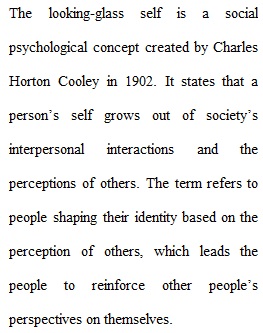


Q Instructions: Answer the following questions. Provide as much detail (& specifics) as possible. Please use examples. 1) What is the self? According to Charles Horton Cooley, explain the “looking glass self” (discuss the three phases).What is meant by significant others? How are significant others related to the self? 2) Explain the dramaturgical approach. What occurs on front-stage? What happens in backstage? How can Erving Goffman’s idea of impression management and face-work be used to understand social behavior? 3) What are total institutions? Identify Goffman’s four traits of total institutions. Discuss how a degradation ceremony is used to mortify one’s sense of self… 4) How does society deal with an elderly population? Discuss differences between disengagement theory and activity theory? Finally, provide solutions to ageism… Witt 4 Socialization Witt 4.pptx How to Complete Your Assignment Submit your work here in the CANVAS system as a Word 97-2003, .docx or other word processing file (Google Docs, Open Office are also acceptable). Directions to Submit On the right-hand Menu, you will see a SUBMIT ASSIGNMENT button with a white plus sign. Click on the SUBMIT ASSIGNMENT button. Then click BROWSE to look for your file on your computer and/or type in your answers as a text entry. When done, click the SUBMIT ASSIGNMENT button.
View Related Questions